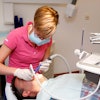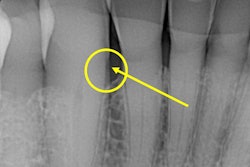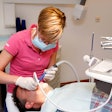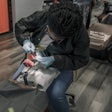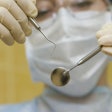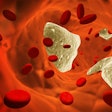
Author's note: Instead of writing to my fellow dental professionals in this article, I'm writing to dental patients in the words below. We are often looked to for our expertise and advice about how dental patients can not only have the best oral health but also the best overall health.
While the words may be for the patient, my hope is that you'll read what I have written below and think about what "splinters" you would identify to your patients and how you're communicating with them about things in the mouth that could be affecting their quality of life.
If you have any questions about my thoughts below, feel free to reach out to me through my website. I'm always happy to connect.
As a patient, you may not see them, feel them, or even know about them. They are sources of infection and inflammation that I call "splinters." I count 14 of them and they could be lurking in your mouth and jawbone. These splinters could affect your entire body over time, and they could cause serious problems for you now or years down the road.
 Dr. Alvin Danenberg.
Dr. Alvin Danenberg.Ultimately, they might compromise your immune system and spread infection and inflammation to all cells and organs. Unfortunately, many medical doctors have no idea that these "splinters" exist even as these physicians try to treat the chronic diseases caused by them.
Here is a way to visualize this complex issue: If a person were healthy by all definitions of health but had a splinter in his or her finger, the area of the splinter could not heal. However, once the splinter was removed, the puncture wound in the skin would heal. But if that individual began to stab that splinter repeatedly into the original puncture wound, the wound would open and never heal.
Likewise, the immune system cannot heal the body as long as splinters exist. And the body cannot heal as long as splinters continuously enter the body and stab it.
Dental splinters
A dental problem can act as a splinter in your finger that never gets removed. The longer it stays in place, the more damage it can do to the surrounding tissues. Eventually, inflammation and infection can spread to other parts of the body. They travel through the blood system and lymph nodes and even across nerve sheaths. And if new irritants occur or are placed in the mouth by a dentist, problems may compound.
Here are 14 of the most pressing dental problems I have seen in my patients over the past 44 years in practice.
1. Mercury
This heavy metal is part of an amalgam filling in a tooth. Some mercury is released as a vapor 24/7. Airborne mercury is toxic to the body and has the potential to accumulate and damage cells in various parts of the body. An estimated 80% of mercury vapor is absorbed by the lungs and passed to the rest of the body, particularly the brain, kidney, liver, lung, and gastrointestinal tract.
2. Biologically incompatible dental fillings
Dental fillings are made up of many different chemicals. Some of them cause toxic responses in some people. The gum and cheeks can get sore, inflamed, and raw from the constant exposure to these substances, day after day. Not everyone is sensitive to the same materials. Your dentist could order biological blood tests to determine if you are sensitive to a specific dental material.
3. Broken or decayed teeth
These allow bacteria to seep into microscopic crevices and break down the tooth surfaces, as well as infect the gum and bone tissues. Deeper infection could cause the nerve of the tooth to die, creating an abscess, pain, and swelling.
4. Broken fillings
These could cause the same problems as broken or decayed teeth.
5. Poor or ill-fitting dentistry
Sometimes a filling, crown, bridge, implant, or partial denture is not made to fit ideally in the mouth or it may become ill-fitting over time. Poorly fitting dental work could cause bite problems damaging the actual tooth, the bone around the tooth root, or the jaw joint and muscles. In addition, bad dental work can irritate the gums and other soft tissues of the mouth, causing pain, bleeding, and swelling.
6. Deposits under the gum
Generally, these could be calcified remnants of bacteria attached to the roots of teeth. You might think of them as barnacles attaching to the bottom of a boat that sits in the water. They are rough and are called calculus or tartar. These are irritants to the surrounding gum and bone and can encourage further progression of infection until they are removed.
7. Cement hiding under the gum
This is another splinter under the gum. It is the result of a dentist or dental assistant not removing excess cement at the time a crown, bridge, or implant crown is cemented in the mouth. Many times, cement under the gum tissues creates acute inflammation, infection, bleeding, and pain. If not removed quickly, it will cause bone damage and could result in the loss of the tooth or implant.
8. Infections inside the tooth (necrotic tooth)
The nerve that lives inside the canal of a tooth is positioned like the carbon in the center of a pencil. It contains blood vessels and nourishing fluids. If it dies or becomes infected, its infection would push out of the tooth at the base of the root (like the carbon point at the writing tip of a pencil). The infection could spread into the surrounding bone causing pain and swelling before moving to other parts of the body.
9. Hopelessly compromised teeth
If a tooth becomes damaged in such a way that it can't be repaired, it should be removed. If left unattended, further infection or damage will occur.
10. Biting forces creating unhealthy pressures on teeth
Normally, teeth come together to bite and chew food. However, one tooth could bite against another tooth with too much pressure. Poorly fitting dental work could be the cause. If this happens, the excess pressure could crack a tooth or cause the teeth to become loose. If these heavy pressures are not corrected, these teeth could be lost. Heavy biting pressures also could make the jaw muscles sore. This is likewise true for implants that are biting down with excessive force.
11. Improper alignment of teeth
Poor tooth position or jaw size can be corrected by a dentist with specialized training. Proper treatment could help treat or prevent chewing and jaw problems, swallowing difficulties, breathing complications, and speaking impediments.
12. Dental implants
Dental implants are artificial roots that are inserted into the jawbone to replace a missing tooth. They usually function extremely well. However, the material in the implant may damage the surrounding gum and bone tissues. Specifically, titanium implants have been shown to create inflammation in the surrounding tissues and weaken the immune system. A zirconia-type implant is more compatible in the mouth.
13. Infections and inflammation embedded in the jawbone
These lesions are called "cavitations." They are areas of retained infection and inflammation in the jaw after a tooth has been extracted. Most of the time these don't cause pain, but sometimes they may be very painful. Cavitations may be the originating cause of other chronic diseases popping up in other parts of the body.
14. Other infections or damage to gum, teeth, bone, jaw joint, or jaw muscle
A meticulous examination by a well-trained dentist may uncover other potential splinters. An in-depth evaluation will take more than five minutes. For my patients, I spend an hour doing a thorough exam.
Final thoughts
This is a lot to consider. You may not know if you have or don't have any of these potential problems. I encourage you to see a well-trained dentist who understands the biological relationships between what goes on in the mouth and what goes on within the rest of the body.
Every cell in our body communicates with every other cell. Our mouth is not an island unto itself. A healthy body depends on a healthy mouth, and a healthy mouth depends on a healthy body. If you discover you have any of these splinters in your mouth, you should be proactive and have them treated efficiently.
Dr. Alvin Danenberg has retired from the private practice of periodontics in Bluffton, SC. He continues to be on the faculty of the College of Integrative Medicine and created its integrative periodontal teaching module. He also spent two years as chief of periodontics at Charleston Air Force Base earlier in his career. His website is drdanenberg.com.
The comments and observations expressed herein do not necessarily reflect the opinions of DrBicuspid.com, nor should they be construed as an endorsement or admonishment of any particular idea, vendor, or organization.

